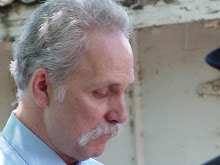Chuan Zhi Shakya
Undeniable Self, Deniable self
by Chuan Zhi Shakya, OHY
Presented October 4, 2005
"Daruma" by Kogaku Soen (1859-1917). Kogaku Soen was one of the first monks to bring Zen to the United States. He is well known for his brush paintings of Boddhidharma (known in Japan as Daruma).
"Self is the lord of self; what higher Lord could there be? When a man subdues well his self, he gains a mastery which is hard to obtain."
-- The Buddha
(Dhammapada, XII.4)
Those seeking to understand Chan often misunderstand the nature of ego transcendence, which is, itself, the Chan experience. While it's impossible to understand it from a purely intellectual vantage, a glimpse into its nature is possible, and with the right Chan practice, anyone can come to fully realize it.
To distinguish between the concept of ego-self and Buddha Self (the True Self - or ego-transcended Self), I will use the conventional lower case "s" when referring to the ego-self, and a capital "S" when referring to Buddha Self.
What is the nature of Self? In Chan, the answer is a spiritual one, dependent on self-reflection, and one that cannot come fully until we achieve a degree of spiritual awareness. In the secular domain, we can investigate Self in terms of what it is not - it is not the self we identify as our ego.
We all recognize the characteristics of ego - they manifest as arrogance, pride and conceit. While it's easy to see these characteristics in others, it's often difficult to see them within ourselves: when we look inward it's too painful to confront so we turn the other way and return to our usual ways of thinking, feeling and behaving. This is the immense power the ego has over us. The danger of succumbing to it is obvious: we, too, act in the way of an ego-dominated individual, convinced that our opinions are the right ones, that our experiences are more valid than another's, that our knowledge is more "correct." Turning away from self-reflection we become like those we admonish.
When we lose the ability, or courage, to self-reflect, our ego steps in for us; and the more we entrust to our ego, the stronger it becomes and the more distant we become from our Self. The result is all varieties of ego-centered convictions and behaviors, but most grievous is the loss of knowledge of who we are as human beings. And therein lies all the pain and suffering that comes when a spiritual life is neglected. Recognizing the ego for what it is, we can begin to let go of it.
The ego is first and foremost concerned about itself - it wants to be strong and dominant, and will manipulate us accordingly by engaging in deception to bend our Will to identify with it. When we identify ourselves with our thoughts and actions and beliefs (all ego-elements), in our minds we become that with which we identify. We are "a republican" or "a democrat" or a "religious person" or "a vegetarian" or "a nice person" or a "victimized person" or a "strong person" or a "spiritual person" or a "smart person" or a "sensitive person" …. We become the center of our known universe. And a very small universe it is. What we fail to recognize is how limiting this state of being really is.
The ego will present numerous roadblocks on our spiritual journey. The Buddha warned about this in the numerous stories he told (the Jataka tales are often attributed to him but may have much more ancient origins) and in his sayings, collectively referred to as the Dhammapada.
The challenge for the spiritual traveler is to detach from the notion that we are what we think we are. In reality, we are everything except what we think we are, and if we take this viewpoint we can begin to undermine our attachment to ego and its influence over us and begin to learn about the nature of our Real Self. Depending on the amount of effort we put into it, ego-transcendence will come fast or slow, but once it does, we will truly be followers of the Chan path.
Deny yourself your opinions. Deny yourself your beliefs. Neti! Neti! Not this! Not This! Negate all those things that you have formed attachments to, one-at-a-time. Do this during every waking moment, unrelentingly, and enlightenment will come quickly. The Buddha Self -- which is you -- will pierce the veils of that slippery autonomous phantasm we call ego.
Subscribe to:
Post Comments (Atom)

No comments:
Post a Comment